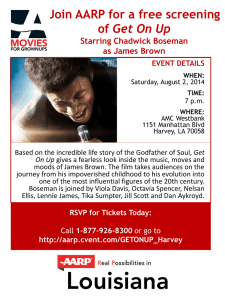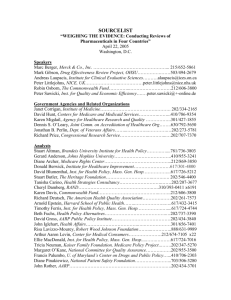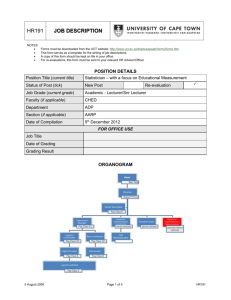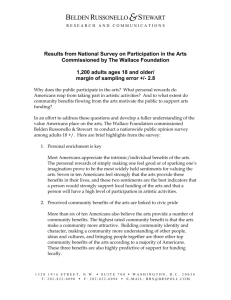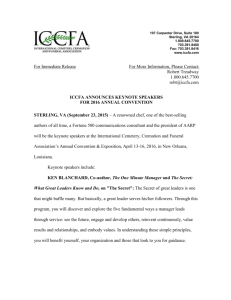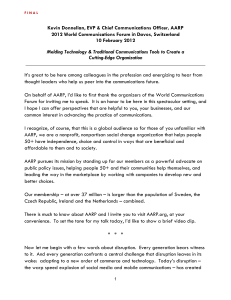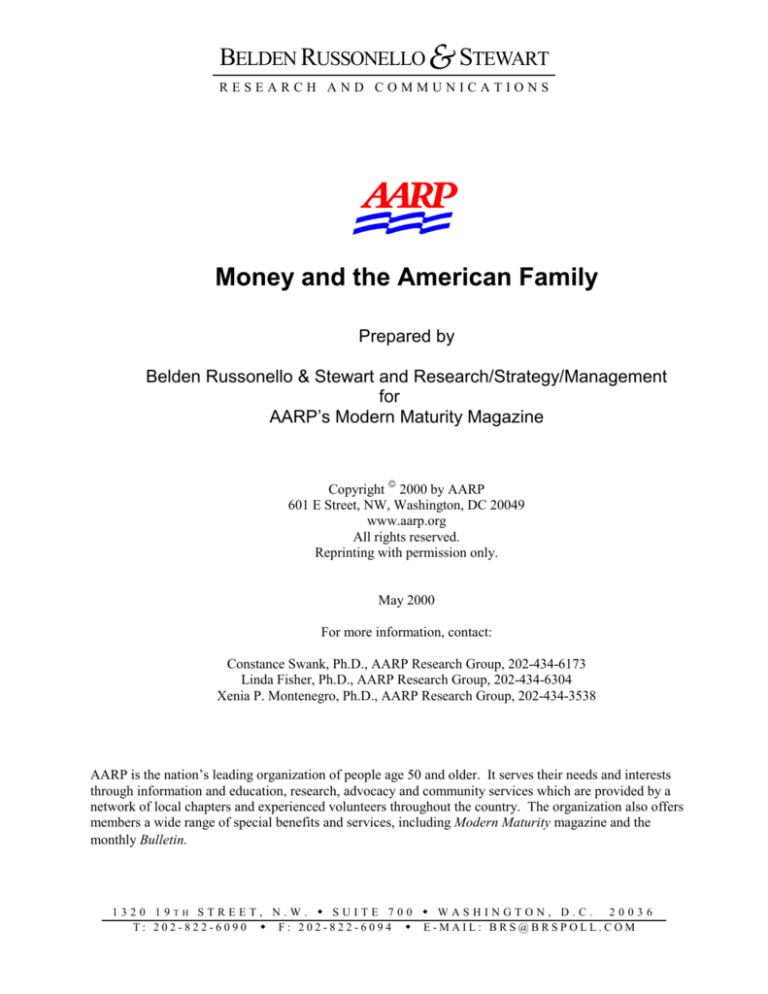
BELDEN RUSSONELLO & STEWART
RESEARCH AND COMMUNICATIONS
Money and the American Family
Prepared by
Belden Russonello & Stewart and Research/Strategy/Management
for
AARP’s Modern Maturity Magazine
Copyright ã 2000 by AARP
601 E Street, NW, Washington, DC 20049
www.aarp.org
All rights reserved.
Reprinting with permission only.
May 2000
For more information, contact:
Constance Swank, Ph.D., AARP Research Group, 202-434-6173
Linda Fisher, Ph.D., AARP Research Group, 202-434-6304
Xenia P. Montenegro, Ph.D., AARP Research Group, 202-434-3538
AARP is the nation’s leading organization of people age 50 and older. It serves their needs and interests
through information and education, research, advocacy and community services which are provided by a
network of local chapters and experienced volunteers throughout the country. The organization also offers
members a wide range of special benefits and services, including Modern Maturity magazine and the
monthly Bulletin.
1320 19TH STREET, N.W. M SUITE 700 M WASHINGTON, D.C. 20036
T: 202-822-6090 M F: 202-822-6094 M E-MAIL: BRS@BRSPOLL.COM
Background and Introduction
Does everyone want to be a millionaire?
With all the attention focused on money in America, AARP feels that developing new
data on the influence of money on American life would make a valuable contribution to
our understanding of the American public. To better serve its constituents, AARP wanted
to compare generational differences on attitudes toward money and how it affects
Americans’ lives and families.
AARP commissioned BRS and R/S/M to conduct a national public opinion survey to
measure attitudes and values relating to the influence of money on American family life.
The national survey questionnaire drew on information from eight public focus groups
that uncovered main themes of Americans’ attitudes toward money and the American
family.
In carrying out our research, we paid special attention to the following:
§
The values or core beliefs - such as caring for and protecting one’s own family,
self-satisfaction, and need for security - that determine behavior and attitudes
about money.
§
Americans’ desire to be wealthy, their priorities for money, and what they would
do with a million dollars.
§
Worry and satisfaction with one’s personal financial situation.
§
Outlooks and projections for the future: hopes and fears about what the financial
future holds for one’s self and family, opinions about retirement, and whether
money will be a problem in the future for one’s self and children.
§
How the desire for or concern about money dictates what we do in our lives,
including the impact of money on career and education decisions, marriage, and
child-bearing decisions.
PREPARED FOR AARP BY BELDEN RUSSONELLO & STEWART AND RESEARCH/STRATEGY/MANAGEMENT
AARP/Modern Maturity Survey on Money and the American Family
April 2000
Page 33
Executive Summary
The United States is enjoying one of the longest periods of economic expansion in its
history. The television program “Who Wants to be a Millionaire” has grabbed the
collective American attention. Ordinary Americans are becoming day traders. Yet others
wonder how they will make ends meet, send the two children to ever-more costly college,
and manage to retire.
In the winter of 2000, Belden Russonello & Stewart (BRS) and
Research/Strategy/Management (R/S/M) conducted a nationwide public opinion survey
for AARP regarding money and the American family. The research documents the
influence of money on American life and provides an in-depth look at what motivates
Americans’ decisions about money and personal finance.
The national survey conducted by BRS and R/S/M for AARP consists of 2,366 interviews. Of
these, 1,501 were carried out among a representative probability sample of the U.S. population
age 18 and older using a random digit dial (RDD) sample. Oversamples of racial minorities were
also interviewed for a total of 400 African Americans, 402 Hispanics, and 401 Asian Americans.
For the oversamples of African Americans and Hispanics, additional targeted RDD samples were
drawn in telephone exchanges with higher than average concentrations of these two groups. The
Asian Americans oversample was randomly drawn from listed telephone numbers with Asian
surnames across the country.
Why be a millionaire?
Most Americans say they would like to be wealthy if given the chance. A majority of
every demographic group, except the WWII generation (born in 1901 – 1935), expresses
a desire to be wealthy. Generation X Plus members (born in 1965 – 1982) and Late Baby
Boomers (born in 1956 – 1964) express the greatest desire for wealth. But why do most
want to be wealthy? Not because they consider earning a lot of money a key
measurement of a successful life. They are more likely to prize having meaningful
relationships with family and friends, having a good education, interesting work, and
religious faith. Americans are also not likely to want to be millionaires because they
think money can buy happiness or love or self-esteem.
Most Americans clearly would like to give wealth a try. Their motivation is the belief that
money makes possible many of the things they value: providing for the needs of their
families, helping friends, contributing to worthy causes, having freedom to live as they
choose, reducing stress, and adding more excitement to life. African Americans are
especially inclined to suggest that having more money would enable these positive
outcomes in their lives.
Many Americans also report that money – or lack of money – has had an impact on their
lives. Seven in ten Americans have altered at least one important aspect of their lives
PREPARED FOR AARP BY BELDEN RUSSONELLO & STEWART AND RESEARCH/STRATEGY/MANAGEMENT
AARP/Modern Maturity Survey on Money and the American Family
April 2000
Page 33
because the money was not there. For example, one in three has decided to work outside
the home instead of staying with children, one in four has postponed going to college,
and one in five has stayed in a marriage because of a lack of financial resources.
Hispanics and African Americans are more likely than others to report having
experienced some of these limitations.
To most Americans, money is not prized for its own sake but seen as an enabler for those
things they value most in life.
What would we do with all that money?
If Americans became millionaires overnight, they believe they would use their new-found
wealth in a number of ways – most often to help family or friends, to save or invest it for
their own futures, to donate it to charity, or to pay off debt.
PREPARED FOR AARP BY BELDEN RUSSONELLO & STEWART AND RESEARCH/STRATEGY/MANAGEMENT
AARP/Modern Maturity Survey on Money and the American Family
May 2000
Page 4
The public’s priorities for money reflect the duality of American views toward the wealthy.
Overwhelmingly, Americans believe that wealth is likely to make people insensitive, greedy, and
feeling superior to others. Americans want to be millionaires, but they do not want to be
considered like other wealthy people; and many of us believe we would react to instantmillionaire status by giving much of it away or putting it away.
The world is our oyster.
Americans feel they are now living in financially sunny times, and they expect the future to get
even brighter. Minorities and Generation X Plus members in particular say that they are
optimistic about the future. Most people under 65 want to retire at 65 rather than continuing to
work full time. Majorities are actively saving and planning for retirement. People who are
already retired are largely content that they have enough resources to live the way they wish.
So while many would welcome a check for a million or more – and while there are certainly very
needy segments of the population among us – the survey shows a public aware of its financial
well being and largely satisfied with its existing wealth.
The 2000 AARP survey paints a picture of an optimistic, practical, even prudent nation when it
comes to money and family. Americans want to be millionaires not because of a love of money,
but because they value the uses that money can have for their families and others they care about.
Different patterns of opinion.
While common themes run through the survey’s findings, Americans are not of one mind about
money and its impact on their lives.
Cluster analysis reveals patterns of opinions among five distinct groups:
§
Left Out – those who have little and want much (6% of the population). The first cluster
group called the Left Out possesses the strongest faith in the value of money and its
importance in measuring a successful life. At the same time, the Left Out are the most
unhappy with their financial status and are highly pessimistic about the future. This
group has low levels of income and education and is more middle-aged than the rest of
the country. We also find a high proportion of minorities in this segment.
§
American Dreamers – those who have some and want more (21% of the population).
We call the second group the American Dreamers because they are in better financial
shape than the first group but are still striving for more. The Dreamers feel generally
content with their average financial status but they desire more wealth. They see money
as a vehicle for obtaining freedom, excitement, and less stress in life. As the youngest
cluster – nearly two-thirds are under age 45 – the American Dreamers are trying to save
but they hold a lot of credit card debt. The Dreamers also contain a high proportion of
minorities.
PREPARED FOR AARP BY BELDEN RUSSONELLO & STEWART AND RESEARCH/STRATEGY/MANAGEMENT
AARP/Modern Maturity Survey on Money and the American Family
May 2000
Page 5
§
High Achievers - those who have much and want much more (24% of the population).
The third distinct attitudinal group is characterized by a very high level of satisfaction
with its financial condition and a very positive outlook for the future combined with the
highest levels of education and income. We call these the High Achievers not only
because they are well off but because they embrace wealth. They want to be wealthy and
express a belief that money is important to a successful life.
§
Settled and Satisfied – those who are comfortable and do not desire more (38% of the
population). Nearly four in ten Americans (38%) belong to the fourth cluster group,
called the Settled and Satisfied because they are highly content with their financial
situation and they hesitate to want more wealth. Unlike the first three cluster groups,
these largely middle-income, married, homeowners place little value on money as a
measure of success, and they are uncertain whether they want to be wealthy. They have
enough to be comfortable, but wealth is not that important to them.
PREPARED FOR AARP BY BELDEN RUSSONELLO & STEWART AND RESEARCH/STRATEGY/MANAGEMENT
AARP/Modern Maturity Survey on Money and the American Family
May 2000
§
Page 6
Wealth-averse – those who have little and are reluctant to want more (11% of the
population). The fifth and final cluster, the Wealth-averse, rejects the importance of
money and decidedly does not want to be wealthy. These Americans are decidedly nonmaterialistic, believing more than most that wealth makes a person greedy and
insensitive. This aversion to wealth does not mask the need that members of this group
have for more money in their lives. With low incomes, low levels of education, and a lot
of debt, the Wealth-averse have had to forego medical care, college, or retirement
because of a lack of money. The Wealth-averse may need money, but they do not seek it.
Money and wealth are truly important to the first three cluster groups, about half the U.S.
population. To the other half of America, money and wealth are not synonymous with success.
Yet they will play key roles in the lives of all.
PREPARED FOR AARP BY BELDEN RUSSONELLO & STEWART AND RESEARCH/STRATEGY/MANAGEMENT

